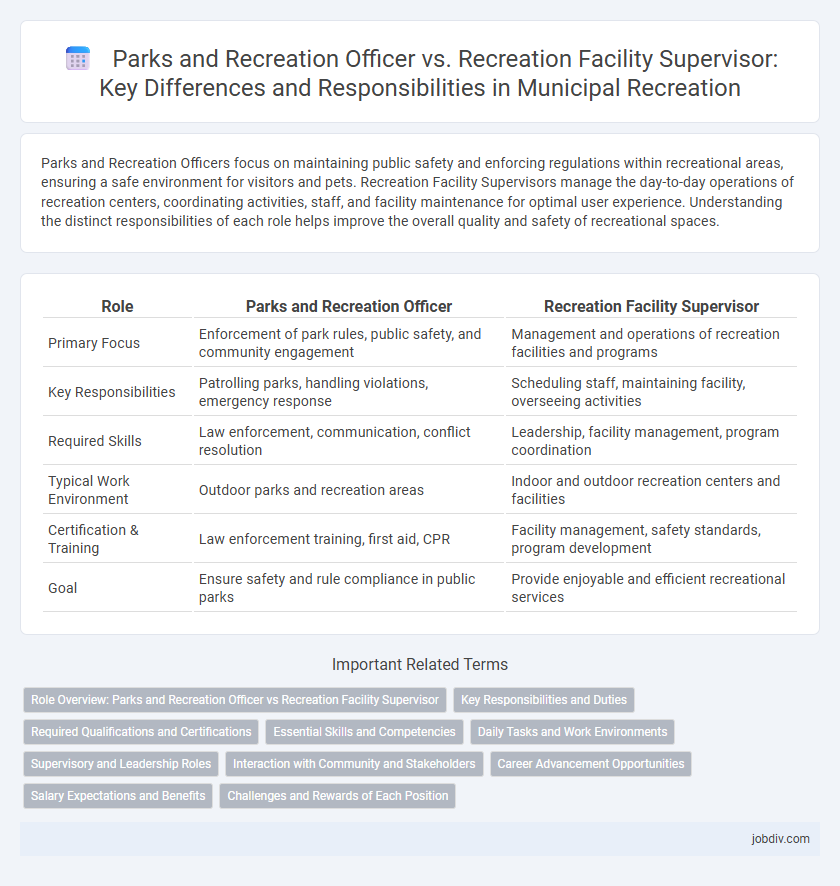Parks and Recreation Officers focus on maintaining public safety and enforcing regulations within recreational areas, ensuring a safe environment for visitors and pets. Recreation Facility Supervisors manage the day-to-day operations of recreation centers, coordinating activities, staff, and facility maintenance for optimal user experience. Understanding the distinct responsibilities of each role helps improve the overall quality and safety of recreational spaces.
Table of Comparison
| Role | Parks and Recreation Officer | Recreation Facility Supervisor |
|---|---|---|
| Primary Focus | Enforcement of park rules, public safety, and community engagement | Management and operations of recreation facilities and programs |
| Key Responsibilities | Patrolling parks, handling violations, emergency response | Scheduling staff, maintaining facility, overseeing activities |
| Required Skills | Law enforcement, communication, conflict resolution | Leadership, facility management, program coordination |
| Typical Work Environment | Outdoor parks and recreation areas | Indoor and outdoor recreation centers and facilities |
| Certification & Training | Law enforcement training, first aid, CPR | Facility management, safety standards, program development |
| Goal | Ensure safety and rule compliance in public parks | Provide enjoyable and efficient recreational services |
Role Overview: Parks and Recreation Officer vs Recreation Facility Supervisor
Parks and Recreation Officers primarily focus on ensuring public safety, enforcing park regulations, and maintaining order within recreational areas, emphasizing community interaction and compliance. Recreation Facility Supervisors oversee daily operations, manage facility staff, and coordinate programs and events to enhance user experience and maximize facility efficiency. Both roles are essential for delivering safe, organized, and engaging recreational environments, but they differ in focus between public safety enforcement and facility management.
Key Responsibilities and Duties
Parks and Recreation Officers primarily enforce park rules, ensure public safety, and monitor recreational areas to maintain a secure and enjoyable environment. Recreation Facility Supervisors manage daily operations of sports complexes, community centers, and other recreational facilities, overseeing staff scheduling, equipment maintenance, and program implementation. Both roles require strong leadership skills, but officers focus on compliance and safety enforcement while supervisors emphasize facility management and program coordination.
Required Qualifications and Certifications
Parks and Recreation Officers typically require a bachelor's degree in parks and recreation management, environmental science, or a related field, along with certifications such as CPR, First Aid, and sometimes law enforcement licenses. Recreation Facility Supervisors often hold degrees or certifications in recreation management, sports administration, or facility operations, with additional qualifications including Certified Park and Recreation Professional (CPRP) or Certified Facility Manager (CFM). Both roles demand strong organizational skills, knowledge of safety regulations, and experience in public interaction or facility oversight.
Essential Skills and Competencies
Parks and Recreation Officers excel in community engagement, conflict resolution, and environmental stewardship, ensuring safe and enjoyable public spaces. Recreation Facility Supervisors demonstrate expertise in facility management, operational logistics, and staff coordination to maintain optimal recreational services. Both roles require strong communication, organizational skills, and knowledge of health and safety regulations to enhance recreational experiences effectively.
Daily Tasks and Work Environments
Parks and Recreation Officers primarily focus on maintaining safety, enforcing park rules, and providing public assistance in outdoor settings such as public parks and recreational trails. Recreation Facility Supervisors manage daily operations of indoor facilities like community centers and sports complexes, overseeing staff schedules, equipment maintenance, and program implementation. Both roles require strong communication skills and adaptability, but Parks and Recreation Officers often work in variable weather conditions, while Recreation Facility Supervisors operate mainly in controlled indoor environments.
Supervisory and Leadership Roles
Parks and Recreation Officers primarily oversee public safety and compliance within parks, focusing on law enforcement and maintaining order, while Recreation Facility Supervisors manage daily operations, staff coordination, and program implementation in recreation centers. The supervisory role of a Recreation Facility Supervisor emphasizes leadership in organizing activities, training personnel, and ensuring facility maintenance to enhance user experience. Both positions require strong leadership skills, but Recreation Facility Supervisors concentrate on operational management and staff supervision, whereas Parks and Recreation Officers prioritize safety enforcement and community engagement.
Interaction with Community and Stakeholders
Parks and Recreation Officers engage directly with community members and local stakeholders to address concerns, promote safety, and foster public involvement in park activities. Recreation Facility Supervisors collaborate closely with users, vendors, and community groups to ensure facility operations meet the needs and expectations of diverse populations. Both roles emphasize proactive communication and feedback integration to enhance recreational experiences and community satisfaction.
Career Advancement Opportunities
Parks and Recreation Officers typically advance by gaining expertise in community engagement and public safety, often moving into senior administrative roles or specialized management positions within municipal departments. Recreation Facility Supervisors leverage operational skills and facility management experience to progress into director-level roles overseeing multiple venues or regional recreation programs. Both careers benefit from certifications in park management or recreation administration, which significantly enhance prospects for leadership and strategic planning positions.
Salary Expectations and Benefits
Parks and Recreation Officers typically earn salaries ranging from $40,000 to $60,000 annually, with benefits including health insurance, retirement plans, and paid leave, reflecting their responsibilities in enforcing park regulations and ensuring visitor safety. Recreation Facility Supervisors often have a slightly higher salary range, approximately $45,000 to $65,000 per year, due to their role in managing facility operations, staff, and programming, and they receive comprehensive benefits similar to those of Parks and Recreation Officers. Both positions may offer additional perks such as wellness programs and professional development opportunities, but Recreation Facility Supervisors generally have greater potential for salary growth and advancement within municipal recreation departments.
Challenges and Rewards of Each Position
Parks and Recreation Officers face challenges such as managing diverse public needs and ensuring safety in open spaces, with rewards including community engagement and promoting outdoor activities. Recreation Facility Supervisors encounter obstacles in maintaining facility operations and coordinating staff schedules, while their role offers the satisfaction of providing organized programs and a well-maintained environment. Both positions require strong leadership and adaptability but differ in focus between outdoor management and facility oversight.
Parks and Recreation Officer vs Recreation Facility Supervisor Infographic

 jobdiv.com
jobdiv.com